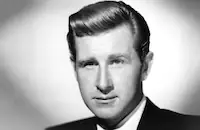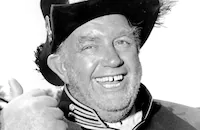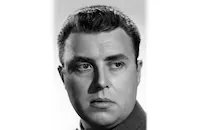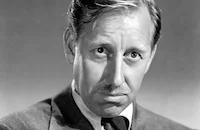Canyon Passage

Brief Synopsis
Cast & Crew
Jacques Tourneur
Dana Andrews
Brian Donlevy
Susan Hayward
Patricia Roc
Ward Bond
Film Details
Technical Specs

Synopsis
In 1856, Logan Stewart, the proprietor of an Oregon mule train, is nearly robbed of a gold shipment while he sleeps in his Portland hotel room. He tells Lucy Overmine, the fiancée of his best friend, George Camrose, that he thinks the bandit was Honey Bragg, whom he believes had earlier killed two miners, though their murders were blamed on the local Indians. While traveling to the mining town of Jacksonville, Logan and Lucy stop at the ranch of Ben Dance and his family. Logan gives a locket to Caroline Marsh, an English immigrant staying with the Dances, though Lucy doubts his serious intentions. Upon his arrival in Jacksonville, Logan is forced to break up a bar fight between his young friend, Vane Blazier, and Bragg. Meanwhile, Lucy chastises George for his gambling, unaware that the problem is so severe that the banker is embezzling funds to cover his losses. Though he is secretly in love with Lucy, Logan proposes to Caroline, and she accepts, much to the chagrin of the jealous Vane. Later, Logan is forced to fight Bragg, and though he defeats the murderous outlaw, he refuses to kill him. After learning of George's excessive gambling, Logan agrees to pay his debts if the banker promises to give up poker. Though he takes the money, George continues his gambling, and even as his debt to professional gambler Jack Lestrade mounts, he tries to romance Lestrade's wife Marta. After killing MacIvar, a miner from whom he has been embezzling, George announces his intention to leave Jacksonville and take Lucy along as his wife. While George wants a quick wedding, Lucy's family insists on an elaborate affair, so she prepares to go to San Francisco with Logan to pick out a wedding dress. Before they leave, Logan orders Lestrade to return his ill-gotten winnings to George, but the gambler instead hires Bragg to kill the entrepreneur. Bragg fails in his attempt to murder Logan, but he does kill Logan and Lucy's horses, leaving them stranded in the woods. The two manage to make it back to Jacksonville, only to learn that George has been arrested for the murder of MacIvar. George is found guilty by a kangaroo court, and knowing that his old friend will be lynched that night, Logan breaks the banker out of jail. While George hides in the woods, the townspeople are informed of an Indian uprising, which has been brought on by Bragg's rape and murder of an Indian woman. Learning that the Indians are bound for the Dance ranch, Logan and the miners head there, and discover that both Ben and his son Asa have been killed during an Indian attack. Caroline is found wandering dazed through the woods, and she later breaks her engagement to Logan, telling him that she would rather live on a farm with a man like Vane than in the city with him. Upon his return to Jacksonville, Logan discovers that his general store has been destroyed by the Indians and George has been captured and killed by the townspeople. Despite the setbacks, the resilient Logan heads for San Francisco to arrange for a line of credit to revive his business, with Lucy at his side.

Director

Jacques Tourneur
Cast

Dana Andrews

Brian Donlevy

Susan Hayward
Patricia Roc

Ward Bond

Hoagy Carmichael

Fay Holden

Stanley Ridges

Lloyd Bridges

Andy Devine
Victor Cutler

Rose Hobart

Halliwell Hobbes
James Cardwell

Onslow Stevens
Tad Devine
Denny Devine

Dorothy Peterson

Ray Teal
Virginia Patton
Francis Mcdonald
Erville Alderson
Ralph Peters
Jack Rockwell
Joseph P. Mack
Gene Stutenroth
Karl Hackett
Jack Clifford
Daral Hudson
Dick Alexander
Wallace Scott
Chief Yowlachie

Peter Whitney
Harry Shannon
Chester Clute

Frank Ferguson
Eddie Dunn
Harlan Briggs
Jack Baxley
Mary Newton
Jack Ingram
Sherry Hall
Danny Jackson
Casey Macgregor
Frank Arnold
Ann Burr
Janet Ann Gallow
David Bair
John Berkes
Will Kaufman
Rex Lease
Crew
Travis Banton
Jack Brooks
Bernard B. Brown
Hoagy Carmichael
Milton Carruth
Edward Cronjager
Henry Cronjager
Carmen Dirigo
Fred Frank
William Fritzsche
Russell A. Gausman
Alexander Golitzen
John B. Goodman
Nanette Grant
William Hedgcock
D. S. Horsley
Anthony Jowitt
Natalie Kalmus
Jean Kenney
Russell Lawson
Ernest Pascal
Jack P. Pierce
Ronald K. Pierce
Richard H. Riedel
Frank Skinner
Leigh Smith
Walter Wanger
Walter Wanger
Chauncy Webb
Mack Wright

Videos
Movie Clip


Film Details
Technical Specs

Award Nominations
Best Song
Articles
Canyon Passage
Set in the Oregon territory in 1856, a time when the city of Portland is merely a growing boom town with streets so muddy they're more like creek beds, and adapted from the novel by Ernest Haycox (whose western fiction also became the basis for John Ford's Stagecoach [1939] and Cecil B. DeMille's Union Pacific [1939], among many other films), the story travels out of the "city" into a more untamed land, a small settlement in the inland mountains. Dana Andrews is Logan Stuart, who runs a thriving freight business with strings of pack mules and horses, the only conveyance through the passes and forest trails. After a business trip to Portland he escorts Lucy (Susan Hayward), the fiancée of his best friend George (Brian Donlevy), through the beautiful but dangerous mountain trails back to Jacksonville. These three form a romantic triangle of sorts, but Tourneur avoids the emotional melodrama of friends-turned-rivals to offer a more measured portrait of friendship tangled up in jealousy and competition, and loyalty that trumps everything.
Canyon Passage isn't one of those simple little town laid out on the prairie around a main street with a grid, building out as the town grows but a rough-hewn collection of businesses and saloons in a community that looks literally hacked out of the wilderness. Surrounded by emerald green forests and dramatic mountains, this is different from the more conventional communities seen in frontier westerns up to now. Jacksonville is a beautiful little town striving for maturity but caught up in the growing pains of free enterprise and new settlements in a place without a marshal or a judge. Roughneck outliers (notably a brutal bully played by Ward Bond), mob justice, and the threat of an Indian uprising are the flip side of the frontier idealism of the new settlers and established families pulling together in the face of adversity.
Through it all rides Hi Linnet (Hoagy Carmichael), the laid-back proprietor of a small trading post and the town's troubadour who offers a wry commentary on the drama playing out. Though not exactly the town's conscience, he is a man to speak his mind and say his piece in every situation. And while he manages to miss all the heavy lifting in a cabin-raising for a young couple (which culminates in their wedding), Hi arrives in time to enjoy the banquet, lead the band and, when the celebration is invaded by the local tribe upset at yet another white settlement in their hunting grounds, defuse tensions with quick thinking. The film, quite unexpectedly, acknowledges the threat that the growing community of settlers poses to the original inhabitants of the land (as well as the threat they pose to the white settlers), and those tensions finally snap when Bond's backwoods thug sets off a war between them.
A lavish color film with a $2.6 million budget and a sturdy cast, Canyon Passage was a major production for producer Walter Wanger, a former independent producer now working for Universal. Along with Dana Andrews (fresh off The Best Years of Our Lives, 1946), Brian Donlevy and rising star Susan Hayward are such supporting players as Hoagy Carmichael (who also wrote and performed four songs for the film, including the Oscar®-nominated "Ole Buttermilk Sky") and John Ford favorites Ward Bond and Andy Devine.
Jacques Tourneur was not Wanger's first choice for director - Stuart Heisler and George Marshall, two western veterans, were both attached before Tourneur was signed. Canyon Passage was not only Tourneur's first western, it was his first color film and the biggest budget of his career up to that point. The son of respected French director Maurice Tourneur, Jacques apprenticed in Hollywood on short subjects and B-movies before making his name directing some of the moodiest and most stylish horror films of the forties - among them Cat People [1942] and I Walked with a Zombie [1943]. He made the most of this new opportunity, capturing stunning outdoor scenes during a month-long shoot on location around Diamond Lake and Medford, Oregon and putting the lush color, stunning forests and dynamic mountain backdrops on screen. The bucolic shots of homesteads on lazy rivers or overlooking green meadows are contrasted with shadowy forest scenes, where ambushes and hunting parties lurk amidst the wild majesty of the landscape. Tourneur suggests rather than shows the most brutal violence, but he reminds us of the cost of settlement in human terms when some of the most beloved members of the community are killed in the attacks.
Producer Wanger fought with Tourneur over the director's pictorial approach to the film, which emphasizes group shots and characters within the landscape, and repeatedly asked for more close-ups. It was a star vehicle, as far as Wanger was concerned, as well as a story of the settling of the west and the frontier spirit. Tourneur delivered a much more complex story about the tensions between individualism and communal good and the ambiguities of the heroes who settled the west, where personal loyalty at times collides with the communal good. It became Wanger's most successful post-war film, according to biographer Matthew Bernstein, but the frustrations of working within the studio system proved too great for the producer and he left Universal, bringing his new star, Susan Hayward, with him. Tourneur went back to RKO to direct one of the masterpieces of film noir and arguably the greatest film of his career: Out of the Past [1947]. Canyon Passage has too often been overlooked in the face of his defining horror classics and films noir. It remains one of his most interesting and satisfying films: complex, visually stunning and full of characters with rough edges and contradictions. No black hats and white hats in this western, just the colors of the new world.
Producer: Walter Wanger
Director: Jacques Tourneur
Screenplay: Ernest Haycox (adapted from the Saturday Evening Post novel "Canyon Passage")
Cinematography: Edward Cronjager
Art Direction: John B. Goodman, Richard H. Riedel
Music: Frank Skinner (uncredited)
Film Editing: Milton Carruth
Cast: Dana Andrews (Logan Stuart), Brian Donlevy (George Camrose), Susan Hayward (Lucy Overmire), Patricia Roc (Caroline Marsh), Ward Bond (Honey Bragg), Hoagy Carmichael (Hi Linnet), Fay Holden (Mrs. Overmire), Stanley Ridges (Jonas Overmire), Lloyd Bridges (Johnny Steele), Andy Devine (Ben Dance).
C-91m.
by Sean Axmaker

Canyon Passage
Canyon Passage - Dana Andrews in Jacques Tourneur's CANYON PASSAGE on DVD
Canyon Passage is arguably not even really a western. It's set in an 1856 Oregon mining community and comes off more as a "frontier drama." Maybe that's one reason that this is a strange, seemingly uneven movie. From the title, setting, costumes and look of things, one expects a traditional western with a traditional plot, but Tourneur and screenwriter Ernest Pascal offer something quite a bit different. We have a morally centered hero (Dana Andrews) and a mean villain (Ward Bond), but their conflict is a mere subplot. There's a shady secondary villain (Brian Donlevy) and an Indian uprising, but these, too, are subplots. In fact, Canyon Passage is a movie filled with stories involving gambling, homesteading, a romantic triangle, and Indians, yet it doesn't feel episodic - it gives a feeling that all the stories are happening at the same time, thereby capturing a slice of life in a strongly atmospheric setting.
Essentially, Canyon Passage is the tale of Logan Stewart (Andrews), a merchant in a small Oregon town who is attracted to the girl (Susan Hayward) of his business partner (Donlevy). Donlevy has racked up serious debt through his gambling addiction, and turns to embezzlement and murder. Ward Bond is a sadistic town troublemaker who has it out for Andrews, and they fight throughout the film. Their bar fight is especially great - they seem to be seriously walloping each other. Meanwhile, the local Indians fume on the sidelines as they watch the white people build homes on land adjacent to the town. One homesteader is played warmly by Andy Devine, who has a catchphrase for every situation and whose real-life kids get special billing for playing his kids on screen. Through it all, strangely enough, wanders Hoagy Carmichael as a traveling minstrel/philosophizer/observer, belting out several smooth songs like "Ole Buttermilk Sky," a big hit of the day which was nominated for an Academy Award.
As bizarre as this concoction sounds, and as little sense as the movie seems to make at times, Canyon Passage casts a pleasantly enveloping spell, with many individual scenes extremely well written and directed. (A house-raising scene reminiscent of Witness, 1984, is a standout.) A lot of story happens off-screen, and for the most part this is a talky film with not a lot of action, but when the action does come it is horrifically brutal - downright shocking, actually - which must have been the contrast that Pascal and Tourneur were going for. Throughout the picture they give us images and characters associated with traditional westerns but do not allow us to experience them in the ways we are used to, through a traditional surface plot; the result is that, consciously or not, we reflect upon these images quite differently, and they seem to convey a level of truthfulness and accuracy that is very high indeed.
Tourneur was an impeccable stylist in his best movies like Out of the Past (1947), Night of the Demon (1957) and I Walked With a Zombie (1943), and this one isn't far behind. He frequently excelled at capturing the culture and atmosphere of his locations (think of the beautifully evocative town of Bridgeport in Out of the Past), and the imagery in Canyon Passage has strong staying power. He's helped by gorgeous location photography by Edward Cronjager and a good score from Frank Skinner.
Though perhaps not for all tastes (kids will be bored), Canyon Passage is a highly mature film that withstands multiple viewings, offering a richer understanding each time. Universal's DVD is for the most part a good transfer, but there are moments where the Technicolor seems to blur in and out of alignment. Whether this is the print or the transfer, I'm not sure, but it doesn't happen too often.
For more information about Canyon Passage, visit Universal Home Entertainment. To order Canyon Passage (available only as part of Vol. 1 of the Classic Western Round-up DVD), go to TCM Shopping.
by Jeremy Arnold
Canyon Passage - Dana Andrews in Jacques Tourneur's CANYON PASSAGE on DVD
Quotes
Trivia
Notes
Ernest Haycox's novel was serialized in The Saturday Evening Post from January 13, 1945 to March 3, 1945. According to a February 1945 Los Angeles Examiner news item, producer Walter Wanger had originally intended to cast John Wayne, Thomas Mitchell and Claire Trevor in the film, having had tremendous success with those actors in his 1939 adaptation of another Haycox novel, Stagecoach (see AFI Catalog of Feature Films, 1931-40; F3.4284). In addition, a May 1945 New York Times news item states that Robert Siodmak was being considered to direct the picture. According to Los Angeles Times, portions of the film were shot on location near Diamond Lake, OR.
The Daily Variety review states that Patricia Roc, a British actress who made her American film debut in the picture, was borrowed by Universal from J. Arthur Rank under a "lend-lease" deal between the two production companies. Hollywood Reporter production charts include Jimmy Aubrey and Walter Doering in the cast, but their appearance in the released film has not been confirmed. Hollywood Reporter production charts also include Ray Collins in the cast, but he did not appear in the film. According to an article in Saturday Evening Post, Hoagy Carmichael, the noted composer, considered his performance as "Hi Linnet" the finest of his career. Carmichael and Jack Brooks's song "Ole Buttermilk Sky" was nominated for an Academy Award, but lost to the Harry Warren-Johnny Mercer tune "On the Atchison, Topeka and Santa Fe" from the M-G-M film The Harvey Girls .

Miscellaneous Notes
Released in United States August 1997
Released in United States on Video June 9, 1998
Released in United States Summer July 26, 1946
Shown at Locarno International Film Festival (50 Years of American Film) August 6-16, 1997.
Released in United States on Video June 9, 1998
Released in United States Summer July 26, 1946
Released in United States August 1997 (Shown at Locarno International Film Festival (50 Years of American Film) August 6-16, 1997.)













